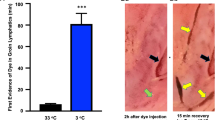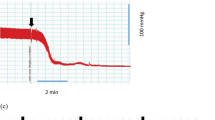Abstract
IT is well known that different species of erythrocytes exhibit wide variations in their susceptibility to venom hæmolysis. Some, such as those of the sheep, the goat and the ox, are totally resistant, while others, like those of the guinea pig and the dog, are very susceptible. Venoms also vary greatly in their hæmolytic activity. Those obtained from the Colubridæ class are hæmolytic in varying degrees, while the Viperidæ species of snakes yield venoms which are mostly non-hæmolytic. In the presence of a trace of lecithin, however, all species of erythrocytes susceptible or refractory lyse very readily with all venoms irrespective of their nature.
This is a preview of subscription content, access via your institution
Access options
Subscribe to this journal
Receive 51 print issues and online access
$199.00 per year
only $3.90 per issue
Buy this article
- Purchase on Springer Link
- Instant access to full article PDF
Prices may be subject to local taxes which are calculated during checkout
Similar content being viewed by others
References
Ber. Klin. Woch., 40 21, 57, 82 (1903).
Ber. Klin. Woch., 40 956, 982 (1903).
Z. Immunität., 12, 134 (1912).
Ind. J. Med. Res., 26, 241 (1938).
Ind. J. Med. Res., 26, 249 (1938).
Biochem. J., 29, 437 (1935).
Biochem. Z., 61, 275 (1933).
Author information
Authors and Affiliations
Rights and permissions
About this article
Cite this article
ROY, A. Lecithin and Venom Hæmolysis. Nature 155, 696–697 (1945). https://doi.org/10.1038/155696a0
Issue Date:
DOI: https://doi.org/10.1038/155696a0
Comments
By submitting a comment you agree to abide by our Terms and Community Guidelines. If you find something abusive or that does not comply with our terms or guidelines please flag it as inappropriate.



